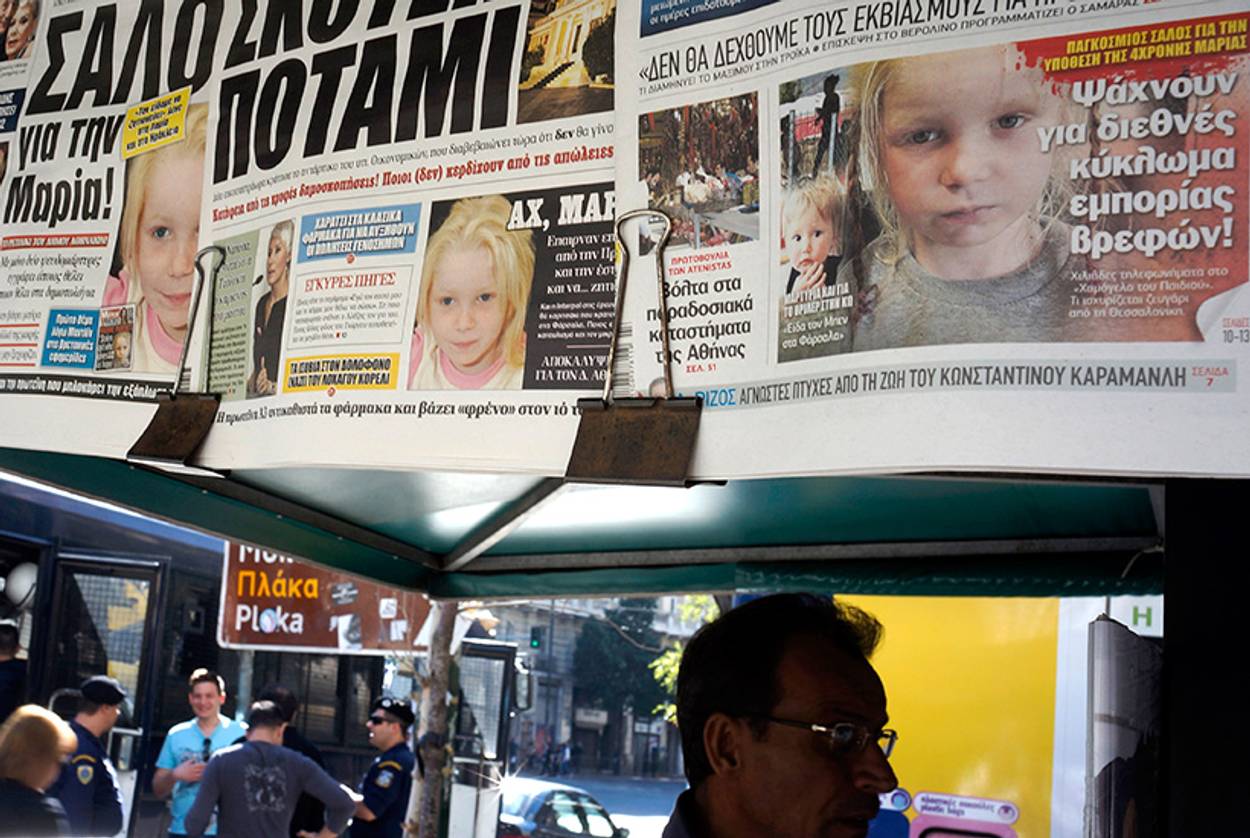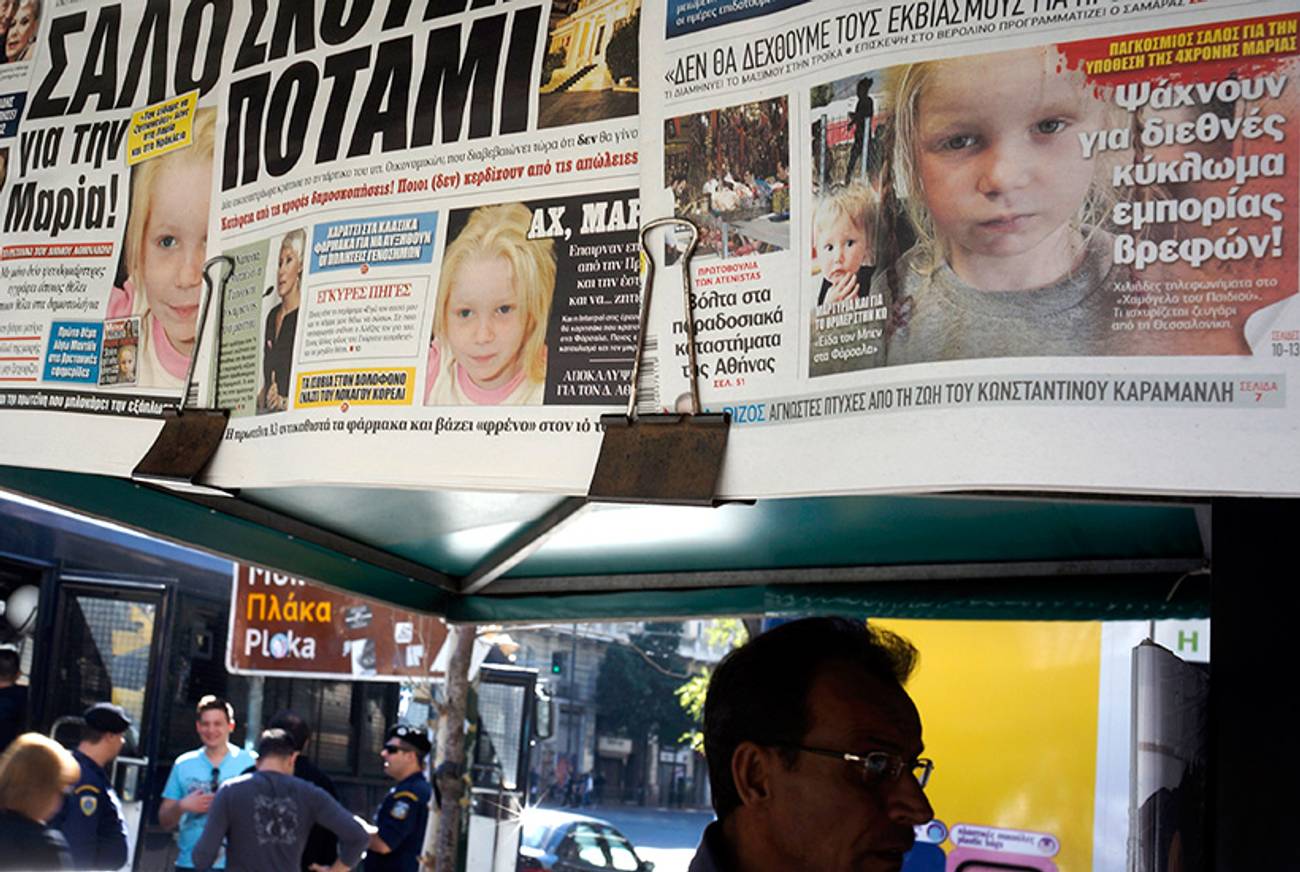Two Roma Child-Trafficking Sagas Underscore a Larger Context of European Prejudice
Old, familiar attitudes are rekindled in the wake of the cases of ‘Maria’ in Greece and a Roma girl in Dublin




If you leave the yard/go to the mall by yourself/run away from home, you’re going to be stolen by Gypsies. Did your mother ever say that to you?
Mine neither.
But from the uproar in Farsala, Greece, where the discovery of an incongruously blonde-haired, blue-eyed 4-year-old girl in a Roma camp sparked a worldwide, Annie-like manhunt for her real parents as well as new terrors about child trafficking and much older ones about the role (or lack thereof) of this always-marginalized people in modern society, a whole lot more European mothers will be telling their ill-behaved children this from now on. That is, if they ever really stopped.
The child, known to the press and police “Maria,” aroused doubts when police, raiding the encampment on suspicion of illegal possession of drugs and weapons, took one look at her and figured the angelic blonde couldn’t possibly belong to Christos Salis and Eleftheria Dimopolou (aka Selini Sali), the noticeably swarthy couple claiming to be her parents. As a DNA test swiftly proved, she didn’t, and she was immediately transferred into public custody until such time as her real parents step forward to claim her. (If they’re looking for her that is; the little girl has been noticeably absent from any international directories of missing children.) The Roma couple, who claimed at first that “Maria” was their natural daughter, have since offered differing accounts of varying plausibility as to how the child came to be in their charge, the most recent—and the one it seems they’re sticking to—that she was the daughter of a “fair-skinned Bulgarian Roma woman” who gave them the girl to care for as she no longer could. The Greek police seem unconvinced.
That was last week. On Wednesday of this week, a girl in Dublin was allowed to return home after DNA testing proved her Roma parents were, in fact, her biological parents. Irish authorities, perhaps acting under the influence of the Greek case, had removed her, reasoning that the blonde-haired, blue-eyed moppet could not possibly belong among her dark-complexioned parents and siblings, regardless of any documentation they could produce.
And this is the problem. The Greek case, under the circumstances, can be seen as solid police investigation into what may be a horrifying instance of child exploitation (it’s unclear as to whether this is a simple case of welfare fraud or something more sinister, just as there’s as yet no word on what is going on with the couple’s 14 other claimed children, 10 of whom are currently unaccounted for, six of whom Dimopolou claimed to have given birth to in a 10-month period); the Irish one decidedly less so. But in both cases, the police acted on nothing more than prejudice of the basest kind. Sometimes it works out. Mostly, it doesn’t.
Look, I don’t care how marginalized or impoverished you are, anyone who would hurt a child deserves the swiftest and most thorough condemnation of law. Nor do centuries of want and oppression excuse criminal activity that preys on others—see how unconvincing Tony Soprano is talking with his daughter in his gleaming mansion in suburban New Jersey about how the poverty of the Mezzogiorno led to and justifies the advent of organized crime. But nobody seems to quite understand the facts here (the Independent seems to be the only paper I can find whose first impulse was to speak to people within the community itself); the marginalization of the Roma people remains an intractable problem in the modern European Union, an entity with borders nearly as porous as when the modern Roma’s nomadic ancestors first arrived from Northern India, and the rise of the xenophobic political far right in the Eastern European countries where they principally can be found today doesn’t seem to portend any kind of humane solution. (I’d have a little more respect for government razing campsites for sanitary or zoning violations if jackbooted skinheads didn’t come to cheer old ladies having their homes demolished like it was a tailgate party, you know?)
One doesn’t like to descend into comment sections, but a perusal of those on these latest stories is like peering into something out of the Malleus Maleficarum, or Borat. Americans, who for the most part see gypsies as something you dress up as on Halloween when your mom forgot to get you a real costume, express utter bafflement, while Europeans, who never tire of calling Americans out on their racism, insist on the toxicity of these people—their essential, unchanging, criminal nature; it’s who they are, they insist. It’s their culture. They can’t be changed, so they have to—somehow—be gotten rid of. (My favorite thread managed to both laud Hitler for killing the Roma along with the Jews, while blaming the Jews for the Roma not getting any credit for the Holocaust. And also, did you know we’re both capitalists and Bolsheviks? Blah blah blah.)
There is anecdotal evidence aplenty of Roma crime—as a former resident of Europe, I even have some of my own, chiefly an incident in Seville involving a group of women who, when I declined to pay 30 euros to have my palm read in a language I don’t understand, decided to relieve me of my purse instead. (They didn’t succeed.) But look, I was once mugged by a mime in Times Square, and that isn’t why I hate mimes! (Like everyone else, I hate mimes because they killed Jesus.)
The Roma may be different from you and me—I mean, apparently, some of them are even natural blondes. But more than anything else, they are people, and people who for the most part have a lot less than pretty much anyone else. What they don’t need is their very own, very modern blood libel. The last I checked, we’re still using ours.
***
Like this article? Sign up for our Daily Digest to get Tablet Magazine’s new content in your inbox each morning.
Rachel Shukert, a Tablet Magazine columnist on pop culture, is the author of the memoirs Have You No Shame? and Everything Is Going To Be Great. Starstruck, the first in a series of three novels, is new from Random House. Her Twitter feed is @rachelshukert.
Rachel Shukert is the author of the memoirs Have You No Shame? and Everything Is Going To Be Great,and the novel Starstruck. She is the creator of the Netflix show The Baby-Sitters Club, and a writer on such series as GLOW and Supergirl. Her Twitter feed is @rachelshukert.